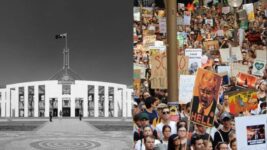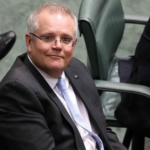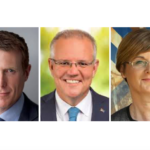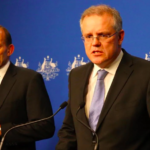Countering Corporate Capture: An Interview With Australian Democracy Network’s Saffron Zomer

The latest IPCC report warned that the fossil fuel-driven climate crisis is accelerating. Yet, in response, PM Scott Morrison stood before the nation last week to announce that rather than move away from fossil fuels, he advises expanding the industry globally as a means of finding a solution.
The fact that our most senior elected representative is making such pronouncements doesn’t make a lot of sense to many Australians, as not only is this rhetoric out of step with heads of state the world over, but a majority of voters in this country don’t want a repeat of the 2019/20 bushfire crisis.
Although, this does follow a pattern. Straight after the bushfires, the pandemic kicked in, and the PM established the National COVID-19 Coordination Commission (NCCC): a body made up of unelected corporate executives to devise a roadmap out of the COVID crisis to economic recovery.
This resulted in Morrison unveiling a gas-fired recovery model last September, despite the recent devastation that had been caused by the bushfires.
And as Australian Democracy Network (ADN) executive director Saffron Zomer points out, this outcome is hardly surprising as NCCC chair Nev Power is a gas executive.
Ending the corporate grip
Established last year, the Australian Democracy Network aims to strengthen the voice of civil society, so that citizens reengage in the democratic processes that underpin our system of representative government, rather than just voting at elections and leaving the rest to corporate influence.
ADN is currently running two major campaigns. #OurDemocracy outlines a framework for creating a fair Australian democracy, based on stamping out corruption, ending the significant influence that corporate money has on political outcomes, and leveling the playing field around election time.
The means by which corporate capture and corruption can be stamped out are well known. They include establishing a federal integrity commission, introducing an enforceable code of conduct, establishing transparency around funding, and putting a halt to ministers moving into industry jobs.
Zomer maintains that despite the obvious hold that corporations have on our representatives in Canberra, the power is still with the people, so it’s about exercising this not only at election time, but also making our voices heard right throughout the entire parliamentary term.
A robust civil society
Yet, rather than acknowledge the right of the people to have their voices heard and respond to them, the Morrison government is currently pushing new laws that, if not disallowed, are set to stifle the ability of civil society organisations – charities and non-for-profits – to carry out advocacy work.
So, ADN has reignited the Hands off Our Charities campaign, which served to prevent an all-out assault on civil society that Turnbull unleashed back in 2017. The campaign now aims to stop Morrison attempting to achieve the same proposed outcome via a different means.
Sydney Criminal Lawyers spoke to the Australian Democracy Network’s Saffron Zomer about why corporations have such a hold on the decisions of government, the Coalition’s obsession with silencing civil society, and how she’s certain the people can change this.

Firstly, the Australian Democracy Network promotes the creation of a thriving democracy. Your organisation posits this would be based on the participation of a robust civil society, as well as an open and accountable government.
Saffron, how would you describe the state of play in regard to our nation’s democracy right now?
Obviously, there are a lot of aspects of our democracy that are going well. Lots of people feel that when they look at other democracies around the world – just look at the riots at Capitol Hill in the US this year.
So, there are lots of aspects of our democratic system that we can be satisfied with.
But democracy is not the kind of system that you set and forget. Every democratic system is in a state of constant renegotiation.
So, it’s not something we can ever take for granted. If it’s working well now, it’s not guaranteed to be working well next year, or in ten years’ time.
Of course, today, there are many aspects to our democracy that aren’t great. There’s a lot of room to build the type of democracy that we want.
Democracy is a vehicle to assist in making those decisions about what type of society we want to live in, and if this system isn’t working well, then we won’t be building the kind of society that we want.
Currently, ADN is running the Our Democracy campaign, which involves three components. The first is stamping out corruption.
There’s an increasing lack of trust in government at present. Why are we in this situation, and how do you assert it can be improved?
This is a global phenomenon. If you look at the thinktanks and organisations that measure democracies all around the world, there is a general decline in trust.
In Australia, it’s partly because people can look at the system and they can see that it’s not working. You can see the patterns. And people feel that the representation we do have oftentimes isn’t real representation.
In terms of what we can do about it, it’s going to be improved by a lot of people doing different things, as that’s the way a democracy is built. It’s a system that’s designed to be a little messy.
Reengaging with the system is something that will be really important in turning trust in government around. There’s a lot of work to do around the culture and the narrative that we have about democracy.
People often have this idea that they can’t expect much from politicians. They tend to roll their eyes and just tune out.
This is a vicious circle, as we should have greater expectations of the people that we send to Canberra to represent us. We should demand that they deliver on these expectations.
There are things we can change about the rules that govern the system that would make it more likely that those we send to Canberra are the representatives that we want them to be.
I’ve spent a lot of time at Parliament House. Most of the people there got into politics for all of the idealistic reasons that you would expect. They wanted to make a difference. They had issues they cared about.
So, you need the rules in place to ensure that good people behave properly. That makes it easier all round.
The second component of Our Democracy is ending cash as a primary means to influence government. In your understanding, how much of a grip do corporations have on government? And how can it be lessened?
It’s a real problem, and this view is shared across many working in civil society. But a lot of it happens behind closed doors through informal channels. So, it’s hard to get a concise measurement as to what’s really happening.
Corporate capture is a multifaceted problem, in terms of the grip it has on our political system. But there are some key things that can be seen.
One is the revolving door: people moving from politics to industry, and from industry back into politics. That is a big part of the problem in terms of how corporate capture is accomplished.
Another big component is donations. Political parties need to raise money, so they need to find donations. And this money facilitates ongoing relationships of trust.
It is not quid pro quo. It’s not giving money and then receiving a policy outcome. That’s illegal. That’s a bribe. It’s much more nuanced than that. But it’s still super effective.
The other way that money manifests itself in politics is the carrot and the stick of running an election campaign.
If you think back to the Tassie election before the last one, the pokies industry spent a huge amount of money and had a huge impact on that election because there was policy at stake that had an impact on their industry.
So, industries that threaten to impact an election can really influence policy. They don’t necessarily need to pick up a phone and say what they want. A lot of this is simply understood.
Oftentimes you won’t find a smoking gun because all of this happens in a very discreet way.
As we draw closer to the next federal election, another pertinent issue the campaign raises is around the way election campaigns are operating. What’s the issue here?
The rules that we have don’t do enough to control the influence of money on our elections.
We need lower donation caps. We need much better transparency about elections and who is giving money to support which candidates.
We definitely need spending caps as well, so we can make it impossible for someone to just drown out the competition with huge amounts of money.
The Centre for Public Integrity assessment found that over the last 20 years there was a billion dollars of dark money donated to the major parties.
And last year, our analysis of the donations data found that about 30 percent of those political parties’ income is dark money.
So, we don’t even know who’s giving them the cash. We don’t know where it’s coming from. And we don’t know where their obligations lie.
That is a huge part of the problem. We don’t actually have the information about what money is going into our political parties.
But the Australian Conservation Foundation analysis of the donations data last year found that the fossil fuel industry – just to name one of the large givers – gave well over a million dollars to the major parties.
Gas gave nearly $700,000, while coal gave over $300,000. You don’t know what they got for it, as it’s illegal for them to get a policy.
But it’s hard to think of another situation where an industry just gives away hundreds of thousands of dollars and doesn’t get anything for it.
I hadn’t heard that figure relating to the gas industry, but it has definitely been benefiting.
Absolutely. That’s the revolving door. When we had the COVID commission set up, they put Nev Power in charge of it.
Then, all of a sudden, the COVID recovery was going to be gas-fired and all of the government ministers were out saying, “It’s a gas-fired recovery.”
You have to wonder about the outcome, when you put a gas executive in charge of the biggest social policy advisory body during this time of crisis, and then they decide what needs to be done is invest public money in gas.
You cofounded Hands Off Our Charities in 2017, when the government was attempting to pass legislation that would impact the ability of charities and not-for-profits to conduct advocacy work.
The campaign was instrumental in bringing that assault to an end.
So, just how important is it to permit civil society organisations to continue to strongly advocate on issues?
It’s absolutely critical. You only have to spend time in a country where you don’t have a robust civil society that’s willing to speak up to see what a difference it makes.
Civil society organisations contribute to democracy in a few really important ways.
The key one is civil society organisations speak for, and also from and with, all kinds of different communities, because they’re within them providing services or advocating for outcomes that they’re employing.
So, if you take away the right of civil society to speak, then you are also silencing all of those citizens who are part of those communities, which those organisations represent. These people can often be those who don’t have a lot of ways to access public debate.
As well, civil society organisations are the places where many people learn the skills of active citizenship.
Much of how you shape your democracy and make your voice heard is by combining forces together with other people who share your concerns or are part of the same community.
Civil society organisations teach people how to organise and have a voice. And we’re a really important way that communities do become active and empowered. `
Finally, the other critical role is the way that civil society organisations translate policy so that regular people can understand what government actions actually mean. That’s critical to holding the government to account for the decisions they make.
Oftentimes people are just going about their lives, and they don’t necessarily have the time to get into the details of these very complex policies that impact our lives.
Civil society organisations that have policy experts do that and can explain the impact to people, so we can understand what’s being done and decided.
The government has new laws before parliament that if not disallowed, will significantly silence the voice of civil society groups.
These organisations represent the people the government is supposed to also represent. So why is the federal Coalition so determined to silence them?
There was that constitutional crisis over dual citizenship that led to Senator Matt Canavan having to step down briefly. At that time, he tweeted what an honour it had been to serve the Australian mining industry.
I remember seeing that and thinking, “Dude, you’re meant to be serving the people of Queensland. That’s who sent you to parliament, not the mining industry.”
But due to the grip that money has over our entire political system, the lines of obligation can become unclear to some of our politicians.
Our political system as a whole has lost its mooring in this way. And it’s up to us to change the rules, so that we get that money out of our system, and it stops distorting how we’re represented.
Also, we need to reengage in political life in a way that forces our representatives to actually represent us. It has to happen both ways.
If you think about the last twenty years, you can see by the data that the strength of political influence from corporate Australia has grown.
But at the same time, if you look at the numbers of people who are members of different civil society organisations – like churches or unions or community organisations – membership numbers have dropped.
So, we have these two spheres. One that’s just growing way too big, and the other one, which has been getting weaker.
So, reengaging in public life is a really important aspect to this. It will rebalance the whole system, so that our representatives remember who they actually work for.
And lastly, Saffron, many in the community have become despondent as they continue to watch the Morrison government take policy decisions that are out of step with sentiment on the ground.
However, these days, a lot of people take Labor as simply a less severe version of the same political agenda.
In your opinion, how are the changes that the Australian Democracy Network advocates for going to come about if it’s in the best interests of both major parties not to implement them?
It’s not in their best interest to change. But in the final analysis if we don’t vote for them, then they’re out of a job.
We need to remember that. The folks who send these people to Canberra hold the power to decide whether they get to go back again.
We just have to use that power in an organised way, and then we can change everything.
At the moment, a whole lot of people don’t believe that’s true. The problems that they see in our political system seem too big to them to fix.
It’s really our job to tell a story that’s plausible about how we can change this over time. It definitely won’t be quick or easy, but these things can change, and we can be the people to do it.







